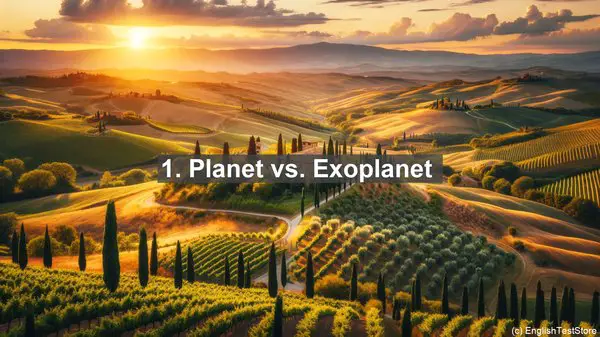Introduction
Today, we’re diving into the fascinating world of exoplanetary science. But before we delve deeper, it’s crucial to clarify some commonly confused words. In this lesson, we’ll address the top 10 terms that often cause confusion. So, let’s get started!
1. Planet vs. Exoplanet
The term ‘planet’ is familiar, but ‘exoplanet’ might be new. While a planet orbits our Sun, an exoplanet orbits a star outside our solar system. In simple terms, exoplanets are planets that belong to other stellar neighborhoods.
2. Habitable vs. Inhabited
These words sound similar, but they have distinct meanings. ‘Habitable’ refers to conditions suitable for life, like a planet’s temperature or atmosphere. On the other hand, ‘inhabited’ means a planet is actually home to living organisms.
3. Galaxy vs. Solar System
A ‘galaxy’ is a vast collection of stars, gas, and dust, held together by gravity. Our Milky Way is an example. In contrast, a ‘solar system’ consists of a star, like our Sun, and all the celestial bodies orbiting it, including planets, asteroids, and comets.
4. Asteroid vs. Meteoroid
Both are rocky objects, but their location makes the difference. An ‘asteroid’ is found in the asteroid belt, a region between Mars and Jupiter. When an asteroid enters Earth’s atmosphere and burns up, it becomes a ‘meteoroid’. If it survives the journey and lands on Earth, it’s called a ‘meteorite’.
5. Revolution vs. Rotation
These terms describe different motions. ‘Revolution’ refers to a celestial body’s orbit around another object. For example, Earth completes one revolution around the Sun in a year. ‘Rotation’, on the other hand, is the spinning of a body around its own axis. Earth’s rotation causes day and night.
6. Nebula vs. Galaxy
Both are captivating cosmic structures, but they differ in scale. A ‘nebula’ is a cloud of gas and dust, often the birthplace of stars. In contrast, a ‘galaxy’ is a massive assembly of billions of stars, along with other components, like planets and black holes.
7. Celestial vs. Terrestrial
These words categorize objects based on their location. ‘Celestial’ refers to anything related to space or the sky, like stars or planets. ‘Terrestrial’, on the other hand, pertains to Earth or land-based phenomena.
8. Comet vs. Meteor
Both are captivating sights in the night sky, but they have different origins. A ‘comet’ is a celestial object composed of ice, dust, and rock. When a comet enters the inner solar system due to its orbit, the Sun’s heat causes the ice to vaporize, creating a glowing coma and tail. A ‘meteor’, on the other hand, is a streak of light caused by a meteoroid burning up in Earth’s atmosphere.
9. Astronomer vs. Astrologer
While these professions sound similar, they are fundamentally different. An ‘astronomer’ is a scientist who studies celestial objects, their properties, and the universe’s physical laws. On the other hand, an ‘astrologer’ believes that celestial positions and movements can influence human affairs and personality traits.

10. Telescope vs. Microscope
These instruments have different purposes. A ‘telescope’ is used to observe distant objects in space, like stars and galaxies. In contrast, a ‘microscope’ is used to study tiny objects, such as cells or microorganisms.

